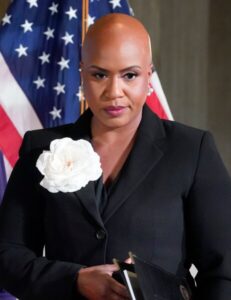
Even at a young age, Black girls attending school are up to seven times more likely to be punished or suspended than their white counterparts. Rep. Ayanna Pressley of Massachusetts has introduced legislation to the House of Representatives to prevent and end this biased and disproportionate punishment.
Ko Bragg of nonprofit news site The 19th has reported that “although boys are suspended and disciplined in school in greater numbers, the disparity between Black girls and white girls is even starker: Research shows that Black girls are suspended six to seven times as often as white girls.”
Bragg added that “Black boys were suspended three times as often as white boys, according to the African American Policy Forum’s Black Girls Matter report.”
In an attempt to combat the problem, Pressley has introduced legislation called the Ending Punitive, Unfair, School-based Harm that is Overt and Unresponsive to Trauma Act, or the Ending PUSHOUT Act. The policy’s name refers to a term coined by scholar Monique Morris, author of Pushout: The Criminalization of Black Girls in Schools, which details how the biased culture that Black girls face in school can ultimately push them into the streets — and the prison system. The bill is co-sponsored by Rep. Bonnie Watson Coleman of New Jersey and Rep. Ilhan Omar of Minnesota.
According to Bragg, the bill was first introduced in December 2019 and “includes $2.5 billion in grant funding to states and schools that ban discipline for infractions of dress code or appearance and grooming policies, for which girls of color are more likely to be suspended.”
“Grantees would also have to eliminate most suspensions for kids in prekindergarten through 5th grade; end corporal punishment; and end partnerships with police, the Department of Homeland Security and Immigration and Customs Enforcement,” Bragg reported. “The funding would incentivize training in implicit bias; trauma-informed training; and investment in counselors, social workers and mental health professionals.”
In an interview with The 19th, Pressley said, “People keep referencing this reckoning that we’re in the midst of, on racial injustice. We have to be committed to dismantling all systems of oppression, and that has got to include discriminatory policies that criminalize adolescent behavior, and disproportionately impact girls of color.”
To prove her point, she cited data from the Center for American Progress that shows the “school-to-confinement pipeline” begins as early as preschool for many, with Black children accounting for more than 42% of preschool suspensions despite making up less than 20% of preschool enrollment.
“The trend continues as children get older,” Bragg reported. “Research shows that girls of color are often criminalized for communication styles and expressions. Black girls are [also] often viewed as older than they are, which contributes to more punitive measures and greater use of force.”
The National Black Women’s Justice Institute has reported that Black girls are four times more likely to be arrested on school grounds than white students. Similarly, the National Women’s Law Center has found that Native and Indigenous girls are three times more likely to be suspended than white girls. And according to GLSEN, an education nonprofit advocating for LGBTQ youth, LGBTQ students of color report higher rates of detention and more than double the rate of suspensions than non-LGBTQ students.
“The criminalization is intersectional, like other forms of oppression,” Pressley said. “It’s really just highlighted the extent that Black girls are policed in their learning environment, including when they are learning remotely. I just want to make sure that we are including these discriminatory policies, and that we are not leaving out of our dismantling systems of oppression [within] our school communities. I just don’t want our young people and our school communities to be left out of this discussion and, certainly, I don’t want them to be left out of the work.”
Related: For more recent diversity and inclusion news, click here.


















